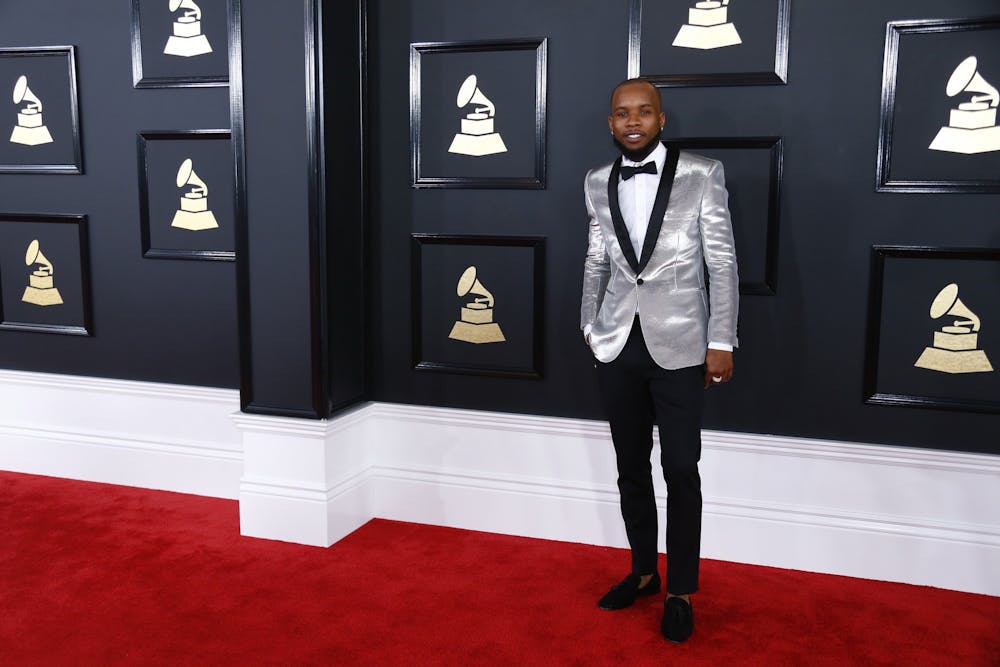I struggle to write this. It feels cruel to write about my disappointment in Black men at a time when we're seeing Black men being killed on the streets. It feels inconsequential to worry about the problems within our community when we face so much opposition from outside of it. But at the end of the day I can't shake this need to speak on what I'm feeling at this point in history, and simply put: Black men, we need to be better than this.
Now I can go on and on about how not every single Black man is guilty of the bigotries I describe. Not all of us are rampant sexists or homophobes, but it'd be naive to believe these behaviors aren't rampant in the Black community, namely from Black men.
Let me be clear: These issues are not exclusive to us Black men. I just express even greater disappointment when I see another Black man, another person like me, try to defend the actions of bad people with the guise of Black power. These celebrities may be Black, and when it's revealed that they aren't good people, it can feel like Blackness itself is being attacked, but instead it is Black womanhood that is being protected.
We see it commonly in our celebrities, be it the homophobia and anti-Asian racism from Steve Harvey or the sexism and violence against women from the likes of Chris Brown, yet examples such as them have a very vocal base of support. I understand why so many of us are quick to defend Black celebrities — historically Black men have been the scapegoat for crimes they didn't commit.
The horrible case of Emmett Till, the young Black man whose violent and wrongful death arguably kick-started the 1960s Civil Rights Movement, was an instance of a woman falsely accusing Till of assault. Sadly, he's only a single example of a large pattern. I get the fear and distrust that comes with seeing Black male celebrities get accused of such heinous crimes like rape.
That said, it's astoundingly naive to believe our community doesn't deal with it's own problems with how we treat Black women.
I've seen, time and time again, Black men get excuses for the actions they've done. Bill Cosby, after allegedly sexually assaulting almost 60 different women, is still defended to this day that he's part of a conspiracy to take down another successful Black man. Chris Brown, despite having a large history of violence against women, gets to have a successful career. R. Kelly, despite hard evidence proving he married a 15-year-old, got ample time to defend himself on television.
But what disappoints me more than the men being defended is the treatment of these victims — Black women.
The victims of these men have been accused of lying and creating a story for the clout, attention and money. Despite this, most people who dare to say something like that can never name me a single victim of Cosby or R. Kelly who isn't also a celebrity. The pattern is perverse.
Women who are victims have been delegitimized and harassed. We saw it earlier this year with Megan Thee Stallion and her injury from rapper Tory Lanez, with people claiming that she was lying and, yet again, trying to tear a Black man down. Even Terry Crews, who bravely testified about his own experience being a victim of sexual assault in the workplace, asserted he didn't have to defend Gabrielle Union after her exit from "America's Got Talent" because the only woman he's concerned about is his wife.
And I have to wonder, as a Black man, are these celebrities and their followers the ones I want to look up to? What is the success they have that so many people want to apparently tear down? I see a fight for equality that amounts to "why do I have to bear responsibility for my actions when my white peers don't?"
It is not Black power for a man to not face justice, to be excused on the behalf of his skin, and if you insist that it is, then Black women's lives don't matter equally to you. Because that's who's hurt by this pattern within our community, time and time again. The vulnerable, the ones who need protection the most.
And I understand why these patterns arose. Having no other option we, historically, had to emulate whiteness. To merely survive, we had to do everything in our power to convince the system we were just as good as the white man. We did everything they did, we thought the same things they did. These behaviors of how we treat women and our relationship to Blackness didn't spontaneously arise within us, and we have to think critically about where they came from.
It's the same reason why so many of us don't address the homophobia in our community either. We equate homosexuality with womanhood which is then equated to weakness, worthlessness and objectification. Just look at how other rappers treat Lil Nas X and how much they try to play his success down.
It didn't happen all on its own — we had these values instilled into us from the society around us when we were deemed property. The lie they'd tell us, that all we had to do is be like the white men next to us and it'd all be okay, still fools so many of us to this day.
And the disappointment I feel because of that is immense. It eats away at me because I know that right now we need unity and support and love, but as long as we don't address issues like how we treat Black women and how we avoid accountability, we won't survive. It might feel cruel to pile this on top of so much that has happened in the past year alone, but Black men, we owe it to ourselves to be better.






